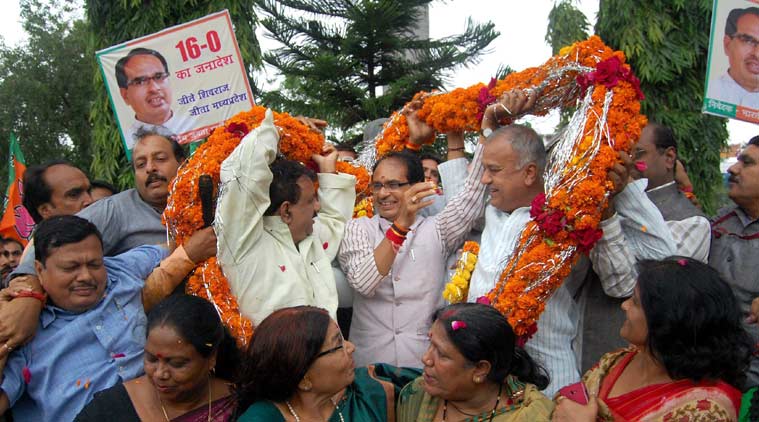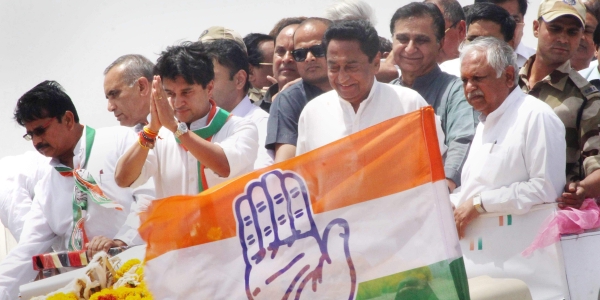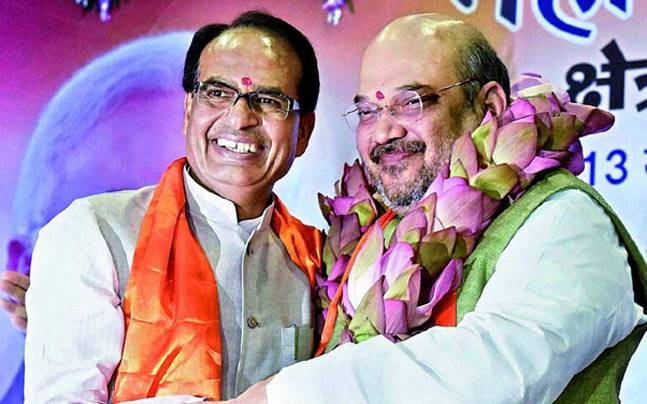Is the BJP Fighting a Losing Battle in Madhya Pradesh?
- Details
- Category: Indian Politics
- Last Updated: Thursday, 12 July 2018 11:54
Political Services Download latest voter list Booth wise
Is the BJP Fighting a Losing Battle in Madhya Pradesh?

In Madhya Pradesh’s largely bipolar polity, less than 4% vote share difference between the Congress and the BJP has decided the victor by a considerable seat margin in successive assembly elections since the state came into being in 1956.
Bhopal: A month has elapsed since the Lokniti-Centre for Developing Societies (CSDS) opinion poll predicted rout of the ruling Bharatiya Janata Party (BJP) in Madhya Pradesh. Ever since, the Shivraj Singh Chouhan-led government has been rattled.
According to the ‘Mood of the Nation’ survey conducted for ABP news channel, the Congress is likely to get 49% vote share and the BJP may only secure 34% of votes, if elections to the 230-member assembly were to be held today. Among the BJP-ruled states, the party fared worst in Madhya Pradesh in the opinion poll.
The survey was conducted in the third week of May, nearly six month ahead of the assembly election in the state.
In the one month after the opinion poll was telecast, two major political developments have taken place in the state and both indicate panic in the BJP government. On June 7, the chief minister pulled out all the stops to thwart Congress president Rahul Gandhi’s rally in Mandsaur. It was organised to observe the first anniversary of the death of six persons in the police firing to crush the farmers’ stir. However, despite the government machinery’s brazen attempts to prevent farmers from attending the rally, it turned out to be a huge success. Rahul Gandhi announced complete debt-waiver of the farmers in ten days, if the Congress comes to power in the state in the forthcoming assembly polls. The rally also provided the state’s Congress leaders an opportunity to show unity among them, much to the consternation of the BJP.
On June 12, BJP president Amit Shah discussed political situation in Madhya Pradesh with state election management committee members in Bhedaghat near Jabalpur for two hours. There was no official briefing of the meeting. However, party sources said Shah indicated that out of existing 165 BJP MLAs, over 100 might be denied ticket due to massive anger against them in their respective constituency. He also said to have reiterated that the party would bank of the organisation rather than Shivraj Singh Chouhan’s face in the coming poll. The BJP president had on May 4 already told that to party workers in Bhopal. A message has gone to the party cadres that Shivraj has turned from an asset to a liability for the BJP as massive anti-incumbency against him has set in.
Recently, Chouhan tacitly acknowledged his exclusion from the chief ministerial race by reasoning that election is won on performance and not on the chief minister’s face. He used to claim exactly the opposite in the run-up to the previous two assembly elections in 2008 and 2013 when he was the party’s chief ministerial face.
Political observers say the trend is not only irreversible but is also likely to intensify. Translated into seats, the 15 % difference in vote share predicted by the opinion poll could mean 160-170 seats to the Congress while the BJP’s tally could shrink from present 165 to 50 seats.
To put the 15% difference in perspective, recalling poll statistics of the three previous assembly elections would be in order.
In Madhya Pradesh’s largely bipolar polity, less than 4% vote share difference between the Congress and the BJP has decided the victor by a considerable seat margin in successive assembly elections since the state came into being in 1956.
In the past
In the 2003 assembly elections, the BJP, led by feisty Uma Bharti scored a massive victory over the ten-year-long Digvijaya Singh rule.
The BJP won 173 seats with 42.5% share of the total votes polled. The Congress had to be content with 38.87% votes and 38 seats. In the next election, the vote share of BJP and the Congress dropped to 37.64% and 32.39 % respectively as independents (8.23%) and the BSP (8.97%) chipped away significant votes of the major rivals. The ruling party’s seats reduced to 143 and Congress’s rose to 71. The BJP again improved its seat tally in the 2013 poll by securing 165 seats with 44.88 % votes while Congress managed to get 42.67% votes and 58 seats.
Significantly, the opinion poll has not factored in the possibility of pre-poll alliance between the Congress and other small opposition parties. Both the Congress and the BSP could improve their seat tally in a big way by entering into a pre-poll alliance for the forthcoming elections in Rajasthan, Madhya Pradesh and Chhattisgarh.
BSP has a solid 7% vote share which is transferable and unshaken. Should the Congress and BSP agree to join hands, the combined vote share of the alliance could go as high as 56% and seat share to 180 seats in Madhya Pradesh.
The Karnataka assembly results have firmed up the Congress leadership’s resolve to join hands with the BSP and the Samajwadi Party before the assembly poll.
Like Janata Dal (Secular) in Karnataka, the BSP could prove to be a spoiler for the Congress in Madhya Pradesh unless they agree on seat sharing before the elections.
The BSP has consolidated its base in districts adjoining Uttar Pradesh such as Bhind, Morena in the Chambal as well as Rewa and Satna in Vindhya region. In other districts too, the party has its cadre base, which though not very strong, can mar the Congress’s chances of victory. The BSP is banking on the Dalit angst against the BJP to increase its vote and seat share. In April this year, Bhind and Morena districts witnessed violent Dalit agitation which resulted in the killing of eight persons in police firing. The agitation was against the Supreme Court’s controversial ruling that is viewed as a dilution of the SC Act.
Scheduled Castes, which comprise 21% of the state’s population, have 37 seats reserved for them. The BJP won 25 of them in the previous polls, primarily due to the fact that the Congress and the BSP contested separately. When the BSP opted out of the electoral race in Chitrakoot (Satna) and Ater (Bhind) assembly by elections in 2017, the Congress defeated the BJP by a significant margin.
The twin victories have convinced the Congress that reaching out to the BSP was imperative to prevent the BJP from regaining Madhya Pradesh for the fourth time in a row. Congress party is also holding discussions with the other like-minded parties such as the Samajwadi Party (SP) and Gondwana Gantantra Party (GGP), a political outfit of the tribals having 47 seats reserved for them.
Samajwadi Party is a fringe player in Madhya Pradesh, mainly confined to Bhind and Morena districts adjoining Uttar Pradesh. But it has chipped away enough votes in the successive elections in the last two decades to harm the Congress in at least a dozen seats.
Congress sources say the party might be inclined to offer 25-30 seats to the BSP and five to the SP. However, formal discussion with either BSP supremo Mayawati or SP chief Akhilesh Yadav is yet to begin.
“We are holding discussions with everybody. The Bharatiya Janata Party (BJP) wins because of fragmentation of the opposition votes and that will be stopped. The pre-poll arrangement will not just be based on arithmetic. It will be arithmetic plus politics, ” says MPCC president Kamal Nath. Organisationally, the Congress is still weak though new MPCC chief Kamal Nath and his team are making serious efforts to revive it at all levels.
The state Congress party has undergone a sea change since Kamal Nath took over as MPCC president. Known for his lavish lifestyle, the businessman-politician has infused his characteristic panache in the organisation’s office too.
The MPCC headquarters in the posh Shivaji Nagar area of Bhopal today looks livelier and swankier than it used to even when the party was in power in the state till 2003. Within weeks of assuming the office, new state Congress president has transformed the look of the office from a typical listless government building into a buzzing corporate workplace.

This was the first major decision he took after taking charge on May 1. The millionaire high-flyer and owner of two planes has brought in other changes too and they are not merely cosmetic. The office hosts regular meetings of Congress workers from across the state; media briefings have become more business-like; a large number of spokespersons and TV panellists have been drafted in; new office bearers in their respective rooms earnestly attend to calls and papers received from party workers from all corners of the state, and, most importantly, no one in the office cribs about resource crunch that used to plague its functioning before.
At the organisation level too, the Congress has taken some swift and drastic decisions to try and remove the perception that its Madhya Pradesh body is too faction-ridden and dormant to take on the BJP government.
In a rare show of unity, each of the top leaders has expressed happiness with the task he is entrusted with. Old guards, who were sitting idle all these years, have also been accommodated in various committees to make them feel a part of the campaign to oust the BJP. Appointments of district Congress committees (DCCs) chiefs, which were hanging fire for years, have been made. All offices of the Congress from the block to the state are abuzz with activity.
A senior Congress leader says he is seeing revisit of the Dabra spirit in the Congress. Dabra is a small town, 45 km north of Gwalior where late Madhavrao Scinidia had hosted a conclave of all senior Congress leaders in the run up to the 1993 assembly election in Madhya Pradesh. The leaders in Dabra vowed to bury the hatchet for the sake of the party’s victory. The show of unity paid off as the Congress won the assembly poll. Since then, Dabra is remembered in the state as a metaphor for unity.
Three versus one
It is for sure a three versus one personality clash though for the sake of pun it might be tempting to describe the forthcoming assembly contest in Madhya Pradesh as Kamal versus Kamal – BJP’s party symbol versus MPCC president Kamal Nath.
But it is much more than that. Three Congress bigwigs – Kamal Nath, Jyotiraditya Scindia and Digvijaya Singh are on the forefront to jointly take on Shivraj Singh Chouhan. None of them is a chief ministerial candidate. The Congress has fielded its top three leaders in various capacities but decided against naming its chief ministerial candidate. The BJP is also not banking on Shivraj.
Battle lines are already drawn for the three versus one contest even though the assembly polls are five months away. The Congress triumvirate has got down to the urgent business of reviving the moribund Congress organisation. Their main rival, the chief minister, too is in full election mode, showering bonanzas on different sections of the voters with an eye on the coming polls. Congress’s main strategy is to cash in on accumulated public anger against the 15 years of the BJP rule. Chouhan is relying on government resources and organisational network.
Neither the Congress trio nor the chief minister is leaving anything to chance in pursuit of their goal which is to defeat each other. Having been out of power for 15 years, it is a do-or-die battle for the Congress. On the other hand, the BJP is also acutely conscious of the fact that defeat in three states – MP, Chhattisgarh and Rajasthan – could sound death knell for the party’s dream to recapture Delhi in the 2019 Lok Sabha election.

In the run up to the high-stake election, each of the top four players is encountering different fault lines. For Kamal Nath, the most formidable challenge is to acclimatise himself with the rough and tumble of street politics as MPCC president. Although he is the seniormost Congress leader in the state, he is reputed as fun-loving king of his citadel – Chhindwara – who is more comfortable in Delhi’s air-conditioned drawing room strategies.
Guna Lok Sabha member Jyotiraditya Scindia, who is head of the party’s campaign committee, too had a similar reputation until a few of years ago. But the scion of the erstwhile Gwalior family has worked hard to shed that image by reaching out to Congress supporters across the state. Still, his task requires the satrap of Gwalior-Chambal region to work harder on emerging as pan-Madhya Pradesh leader.
Digvijaya Singh, who is tasked with coordinating with all committees that the MPCC has formed to win the election, has endured the humiliation of being described as the chief destroyer of the Congress for a long time. Thanks to his arduous Narmada Yatra that took him away from active social and political life for six months until April this year, the former chief minister has regained prestige to a great extent. He is the only pan-Madhya Pradesh leader of the three. All through his famous Narmada yatra, Digvijaya was welcomed by party workers. The yatra has immensely contributed to his image makeover. He is no longer trolled on social media as an irresponsible, anti-Hindu leader.
Of the four players, chief minister Shivraj Singh Chouhan faces the worst image crisis. He is now likened to Digvijaya Singh of 2003. In the run-up to the 2003 assembly election, the BJP had invented ‘Mr Bantadhar” as sobriquet for the then chief minister Digvijay Singh. The sobriquet stuck on him so deep that the Congress tally in the election got reduced to 38 in the assembly of 230. Chouhan, more or less, stares at a similar fate in this election. Such has become his reputation within the party that MLAS say they would rather not have him in their constituency for campaigning for fear of losing.
However, organisation remains the BJP’s biggest strength in Madhya Pradesh where the party from its erstwhile avatar as Jansangh grew from strength to strength since early fifties even when the Congress citadel looked impregnable. But galvanising the organisation and motivating workers, mostly from the Rashtriya Swayam Sewak Sangh cadres, for support of sitting BJP MLAs is a formidable challenge for the leadership.
Party workers have been voicing their anger against the sitting lawmakers for years in all possible forums within and outside the party, but their anguish has remained largely unaddressed. The workers’ main grouse is that while MLAs are busy furthering their own nest, the loyal rank and file often gets raw deal from the government.
The cadre is also unhappy because, in its view, the chief minister has allowed himself to be surrounded by a coterie of chosen bureaucrats who are completely cut-off from ground realities.
At the root of the party workers’ disenchantment is the all-pervasive corruption in the government. The Vyapam scam, India’s biggest job-cum-admission racket, of course, is the most notorious manifestation of the organized swindle that the Shivraj Singh government is accused of. The government’s tentative and ever-changing policies aimed at providing remunerative prices to farmers have done more harm than good to the targeted beneficiaries due to their shoddy and corruption-ridden implementation. Most of these policies have ended up enriching traders, middlemen and bureaucrats at the expense of the farmers.
Even as the agrarian crisis is raging unabated, Shivraj Singh Chouhan sought to play up the Hindutva card by nominating five Hindu sants as minister of state. They have been nominated members of a committee for conservation of Narmada river. The move, however, backfired, because the nomination came just a day before the sants were to launch a yatra to expose the state government’s claims of having made a world record by planting 6.72 crore saplings along the Narmada river in July last year. The much-touted plantation happened on culmination of the chief minister’s 144-day long Narmada perambulation yatra, covering 3,000 km from the origin to the Arabian Sea in Gujarat.
Critics called the move as the chief minister’s abject capitulation to the sants’ blackmail. Even the RSS was reported to be unhappy with the chief minister’s arbitrary decision to accord minister of state status to religious leaders.
Source:Thewire


